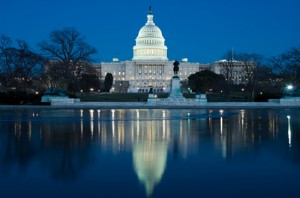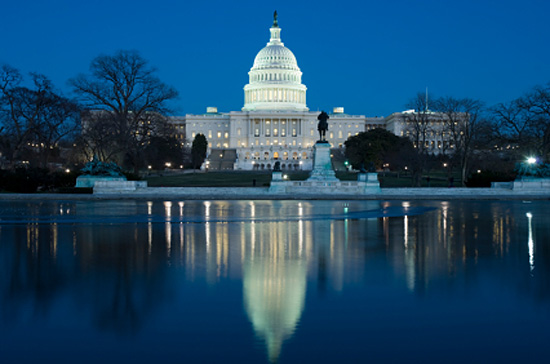 By James Rosen, McClatchy Newspapers –
By James Rosen, McClatchy Newspapers –
WASHINGTON — For decades, lawmakers helped home-state manufacturers lower the cost of imported materials by crafting tiny bills that reduced or eliminated tariffs on products that range from massive factory equipment to vats of industrial-strength chemicals.
Every year or two, hundreds of these duty suspensions would be rolled into one big miscellaneous tariff bill — an MTB, in Capitol Hill parlance — and passed. Such legislation was so routine, it was approved by unanimous voice vote.
But like so much else in Washington these days, the commonplace has become controversial, and these targeted tax breaks have come under scrutiny.
The scrutiny has opened a rift among Republican lawmakers. They like tariff reductions as tax cuts, but some who favor a flatter income-tax system and a “level playing field” for businesses see miscellaneous tariff bills as congressional pork doled out to favored companies with lobbyists to push for the duty suspensions and campaign contributions for senators or representatives who get them.
Perhaps nowhere is the rift clearer than in South Carolina, a conservative bastion with seven of eight congressional seats held by Republicans.
Sen. Jim DeMint is known as Senator Tea Party, while Rep. Mick Mulvaney is a tea party favorite who joined Congress in the 2010 wave of conservative newcomers.
DeMint, a Greenville Republican, wants to limit lawmakers’ role in obtaining the duty suspensions, which he views as another form of the spending earmarks he’s led colleagues to ban.
“Why must we erect needless obstacles and force businesses to hire lobbyists and grovel for attention from politicians just to be heard?” DeMint told McClatchy Newspapers.
Mulvaney, an Indian Land Republican, disagrees with the junior senator from his state — and has let DeMint know it.
“I’ve had very candid conversations with Sen. DeMint,” Mulvaney said. “He’s trying to make the case why these are earmarks. I just don’t get it.”
DeMint and Sen. Claire McCaskill, a Missouri Democrat who’s waged her own battle against earmarks, are pushing legislation that would allow companies to seek duty relief directly from the International Trade Commission. Under the current system, the trade commission vets such requests after receiving them from members of Congress.
“We have a win-win, bipartisan solution that will result in more tariff suspensions, streamlines the process, ends the pay-to-play scheme, gives small businesses better access and still retains congressional authority,” DeMint said.
The DeMint-McCaskill measure would require Congress to pass legislation containing the duty reductions or removals the trade commission approved. It would retain the current $500,000 maximum for each tariff suspension, most of which last two or three years.
South Carolina’s senior senator, fellow Republican Lindsey Graham, said that while the DeMint-McCaskill bill had some merit, it might create other problems.
“Is it better to have unelected bureaucrats who are really not accountable to the voters make these decisions or is it better to have elected officials do the gate-keeping?” Graham said.
Instead of lawmakers trading votes among themselves, Graham said, transferring more power to the executive branch could lead to favor exchanges between a presidential administration and members of Congress.
“I’m sure I could have gotten money to deepen the Port of Charleston if I had voted for Obamacare,” Graham said, referring to President Barack Obama’s signature 2010 health care law.
The political problem for Mulvaney is that he was among the 87 House Republican freshmen who, shortly after their 2010 elections, pushed their party elders to adopt a House rule that expanded the earmark ban to include “limited tariff benefits.”
Now that Mulvaney has been in Washington for 16 months, he’s having second thoughts.
Mulvaney joined 64 other House Republican freshmen — three-quarters of the congressional class — last month in writing to Speaker John Boehner, R-Ohio, to ask that tariff suspensions be excluded from the earmark ban.
“The MTB remains critical to expanding manufacturing employment,” the lawmakers wrote. “In other words, it’s a jobs bill.”
McCaskill, a first-term Democrat who’s built a reputation as a maverick and faces a tough re-election fight in November, criticized the effort to rehabilitate lawmakers’ advocacy of tariff suspensions.
“This bipartisan bill is an important step to strengthen a valuable tool for our job creators while ensuring that tool doesn’t turn into a back door for allowing earmarks to worm their way back into the legislative process,” she said.
Graham said he’d received requests from 79 companies, all either based in South Carolina or with substantial operations in the state, and was vetting them. He wrote 21 tariff-suspension bills in the 2009-10 session of Congress for such firms, among them Michelin, Milliken & Co. and Nation Ford Chemical.
Milliken is Graham’s fifth-largest career campaign donor, with $59,365 in total contributions, according to the Center for Responsive Politics, a Washington group that tracks money in politics.
Graham said that Milliken, among the dwindling number of large American textile firms, backed him financially because it supported his political stances, not in order to influence him.
Michelin, among the world’s largest tire-makers, spent $1.1 million in 2010 on issues that included lobbying on tariff-suspension bills introduced by Graham, according to a recent analysis by the Sunlight Foundation, a government-oversight group in Washington.
Steve Evered, a Michelin lobbyist in Greenville, S.C., said the tire manufacturer sought tariff relief only on foreign-made materials and products that weren’t made in the United States, as required by congressional guidelines.
Several years ago, Evered said, a North Carolina company objected to Michelin’s bid to eliminate the duty on imported presses it uses to make tires for big earthmover machines. When Michelin representatives sent specs and showed that each mold was huge — almost as large as a Ferris wheel — the domestic firm realized it couldn’t make equipment that large and withdrew its objection.









